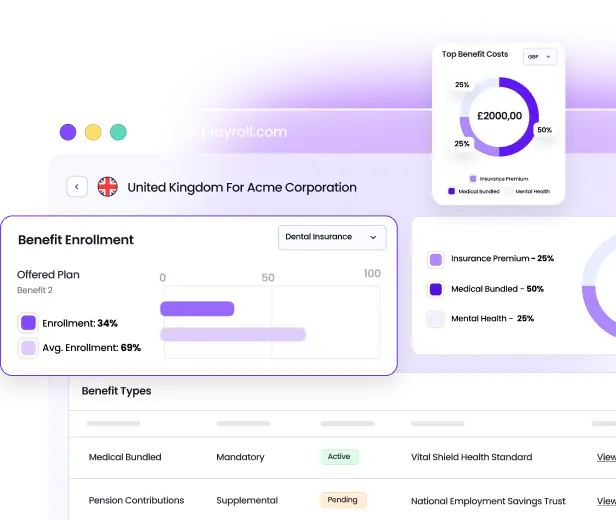Who Is Entitled to Employee Benefits In Qatar?
In Qatar, entitlement to employee benefits is primarily determined by the Qatar Labour Law, which applies to most full-time employees working under a valid employment contract. Both Qatari nationals and expatriate employees are covered, provided they are employed by a Qatar-based entity. Full-time employees receive the full suite of mandatory benefits – including leave entitlements, regulated working hours and end-of-service gratuity.
Part-time or fixed-term employees may be eligible for benefits depending on the terms outlined in their contracts. While the Labour Law sets minimum standards, employers can always provide enhanced benefits to improve competitiveness in the market.
Overview of Employee Benefits In Qatar
Employee benefits in Qatar play a significant role in shaping compensation packages, especially given the country’s large expatriate workforce. Compared to other global markets, Qatar offers a structured but flexible benefits environment, where mandatory entitlements form the foundation and supplemental benefits are widely used to attract top talent.
Employers often enhance packages with allowances – such as housing or transportation – which are highly valued due to the cost of living and relocation needs.
Mandatory Employee Benefits In Qatar
Mandatory benefits are legally required and form the core of any employee benefits package in Qatar. Here’s a comprehensive list of mandatory benefits in Qatar:
Paid Annual Leave
Employees are entitled to a minimum of three weeks of paid annual leave after one year of service. This increases to four weeks after five years. Employers must coordinate leave schedules with employees and ensure payment is made at the employee’s full wage rate.
Paid Sick Leave
Employees qualify for sick leave after completing a certain employment period. A certified medical certificate is required. Typically, the first two weeks are paid in full, the following four weeks at half pay, and further leave may be unpaid, depending on regulations.
End-of-Service Gratuity
Employees who complete at least one year of service are eligible for an end-of-service gratuity. This is calculated based on their final basic wage and duration of service. Employers are responsible for accurate record-keeping to ensure compliance.
Paid Public Holidays
Employees are entitled to paid leave on public holidays as designated by the Qatari government. These days are separate from annual leave entitlements.
Working-Hours and Overtime Rules
The typical working week is capped at 48 hours, with daily hours reduced during Ramadan. Work beyond these limits must be compensated at overtime rates. Employers are required to maintain accurate logs of employee hours.
Pension / Social Security for Qatari Nationals
Qatari nationals benefit from a government-run pension scheme. Both employer and employee must contribute, and accurate reporting is essential to ensure compliance with the state’s General Retirement and Social Insurance Authority (GRSIA).
Supplemental Employee Benefits In Qatar
Supplemental benefits are not required by law, but can help you stand out as an employer and attract top talent. They include:
Housing Allowance or Company Accommodation
Due to high living costs, especially in Doha, many employers offer housing allowances or direct accommodation. This benefit is especially important for expatriates and helps ease the financial and logistical burden of relocation.
Transport Allowance or Shuttle Services
To support daily commutes, companies may provide a monthly transport allowance or shuttle service. These benefits reduce stress and improve punctuality, especially in urban areas with limited public transport.
Health Insurance Covering Dependents
While basic coverage may be mandatory, many employers go further by covering employees’ spouses and children. Family medical coverage is a major attraction for international hires relocating with families.
Education Allowance for Children
Given the high cost of private schooling in Qatar, an education allowance is a highly valued benefit. It enhances recruitment of experienced expatriates and supports long-term retention.
Wellness Programmes and Gym Memberships
Well-being initiatives – like gym memberships, health assessments and wellness stipends – promote healthier lifestyles and reduce absenteeism, while contributing to employee morale and productivity.
Tax Implications of Employee Benefits in Qatar
Qatar does not impose personal income tax, making most employee benefits tax-free. This includes allowances for housing, transportation and education. However, employers must:
- Maintain documentation on all benefit allocations
- Ensure payroll records accurately reflect benefit values
- Submit mandatory pension contributions for Qatari employees
Legal Considerations for Employee Benefits in Qatar
Employee benefits are regulated by the Qatar Labour Law, which mandates entitlements such as annual leave, sick leave, overtime, and end-of-service gratuity. Non-compliance may result in labour disputes, penalties or legal action from employees or authorities.
Employers should align contracts and benefits with visa types, employment terms and payroll systems. Expatriate-heavy companies must ensure that both labour and immigration requirements are fulfilled. Annual reviews of benefits help ensure ongoing compliance with legal updates.
Benefit terms, eligibility, and amounts should be clearly outlined in employment contracts, with supporting documentation maintained to avoid disputes and ensure transparency.
How Benefits Impact Employee Cost
Benefits significantly increase the total cost of employment in Qatar, especially when factoring in paid leave, overtime, and gratuity obligations. Supplemental benefits like housing or education allowances can further elevate compensation packages.
To manage these costs, employers can:
- Use tiered benefits by role or seniority
- Focus on high-impact perks that matter most to employees
- Regularly review benefit usage and ROI
- Benchmark offerings against local competitors
Well-structured benefits lead to better employee retention and satisfaction, which can reduce hiring costs and improve long-term productivity.
Disclaimer
THIS CONTENT IS FOR INFORMATIONAL PURPOSES ONLY AND DOES NOT CONSTITUTE LEGAL OR TAX ADVICE. You should always consult with and rely on your own legal and/or tax advisor(s). Playroll does not provide legal or tax advice. The information is general and not tailored to a specific company or workforce and does not reflect Playroll’s product delivery in any given jurisdiction. Playroll makes no representations or warranties concerning the accuracy, completeness, or timeliness of this information and shall have no liability arising out of or in connection with it, including any loss caused by use of, or reliance on, the information.
.svg)
.svg)
.svg)





.svg)



.png)











.webp)









.svg)